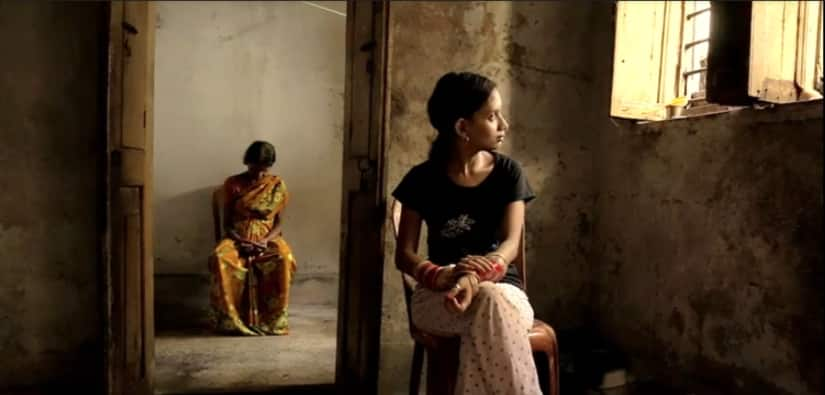Documentaries on mental health are rare, and the ones that exist only draw attention to the crisis which is evident. Not that informative films, especially on mental health, are not significant but over the years, the outlook towards mental illness has seen a drastic change in its perception. It encourages shifting focus from the suffering to the sufferer — what they think, how they feel and how there is more to them than their mental health issues have now become matters to consider seriously. Film director and associate professor at the Satyajit Ray Film and TV Institute, Putul Mahmood’s feature documentary film Atasi welcomes this shift. It is produced by Ratnaboli Ray, the founder of Anjali Mental Health Rights Organisation. The film tells the story of a young woman called Atasi, who after enduring years of emotional and physical abuse finds the strength to recover and become empowered. A public premiere was recently organised by Anjali at Jadavpur University where the film was received very well by an audience of 400, which included mental health activists, professionals and students. It has now been selected to be screened at the International Documentary and Short Fiction Film Festival of Kerala. [caption id=“attachment_4754301” align=“alignnone” width=“825”]  A still from Putul Mahmood’s Atasi[/caption] There is probably not much to the world of Atasi — this is the initial thought that comes to mind after watching the first five minutes of the film. It opens with a surreal, quiet shot of Atasi’s mother sitting with her arm around her brother — the only two people Atasi has in her life, and also the ones who betrayed her. We then follow Atasi as she walks through the narrow lane which barely separates cramped houses, as she recalls the day when she was forcefully hauled through those same lanes and taken to a mental institution. Atasi was labelled ‘mad’ by her family. After her father’s death, who she was very close to, her family found a horrific way to abandon her — a way often used against Indian women by their families. Just like any other day, she was sitting at home watching TV when a group of people including some police officers forcefully dragged her out of the house, beat her up and took her to the Calcutta Pavlov Hospital. Atasi came home after two years of ‘treatment’. Stigma prevents families from accepting members back once they have been in mental health institutions for long. For Atasi, hate was an additional reason. Her home did not exhibit any signs of welcome after she returned. The air was more hostile than ever, and loneliness was worsening her state. But then, Atasi finds a friend — a fellow traveller in her journey who provides her with the support she had always needed. She meets Deep online and they build a bond which is so strong that they eventually decide to get married. With Deep in her life, Atasi is able to restore her sense of authority and is given back her rights. The viewer also observes a difference in the way she now responds to hostility; she is no longer shackled. ‘Love’ or rather ‘choosing to love and be loved’ is a key factor in Atasi’s recovery, and this is what Putul wants the viewers to focus on. Deep is the most important person in Atasi’s life, and yet he is not the center of focus. [caption id=“attachment_4754311” align=“alignnone” width=“825”]  Instead of focusing on ‘fixing’ her weakness, Atasi acknowledges the protagonist’s strengths and happiness[/caption] This is because the film explains why Atasi’s ability to love is a strength rather than a solution. One of the most integral principles of positive psychology is written all over her story. It focuses on recognising a person’s strengths, what makes them happy, gives them the capacity to control, rather than ‘fixing’ their weaknesses. This is where Deep comes in: He helps Atasi to explore that strength, eventually developing her potential and agency. Putul chooses a dramatic style of presentation which does not require the lead character to make any effort, and this is what distinguishes it from interview-based documentaries. There is a fiery scene where an argument breaks out between Atasi, her mother and her brother which is brings to the fore the toxicity in families that is often never addressed. It vaguely reminded me of RD Laing’s infamous book, Sanity, Madness and the Family, in which Laing presents an argument about the role that families play in contributing to mental health issues. There is a subtle nod to the book at the end of the film where Atasi is asked why she thinks her family did this to her, and she says she might never understand with a muddled expression. Films can talk about mental health without being about it, and Atasi exemplifies this well. It doesn’t look down on its subject’s misery but rather shows how important it is to believe that people can gain resilience despite suffering from mental health issues. The environment in Atasi makes it clear that she must have suffered from mental health issues, but her narration of her own story compels us to appreciate her fight against these issues rather than simply sympathise with her. Mental health does not operate in a vacuum. There are several factors in our lives that play an important role in shaping it, bettering it or destroying it. Public discussions on mental health have been a discourse of pathological themes. While only intending to create awareness, they often point more at the illness than they do at the person, centering it and eventually indirectly victimising the person. Atasi is an exception. It’s her story, not the story of her ‘problem’.
Atasi tells the story of a woman who battles years of emotional and physical abuse, and uses love as a strength rather than a solution to her mental health issues
Advertisement
End of Article


)
)
)
)
)
)
)
)
)



